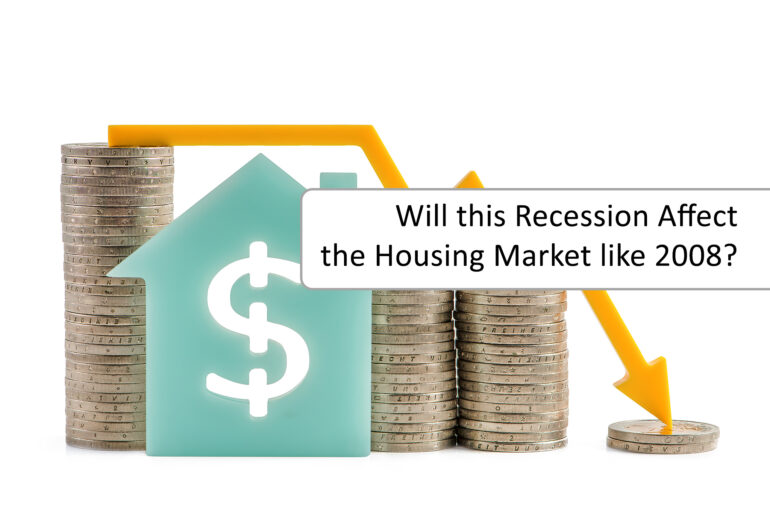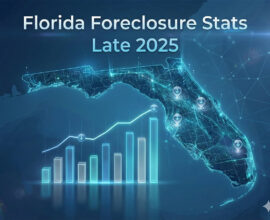Will a Recession Affect the Housing Market as It Did in 2008?
Since the July 28 announcement that US GDP fell two quarters in a row, many believe we are now in recession (or at least close to one).
As a real estate investor or homeowner, this may sound like bad news. It may even bring flashbacks to the last major US recession in 2008 when the housing market plummeted, and many homeowners lost fortunes.
If this sounds like you (or you’re afraid it could become you), read on.
In this article, we’ll go over why the housing market crashed in 2008, what’s different about this recession, and what’s next for the US housing market.
Let’s get started!
What Caused the 2008 Housing Crash?
The causes of the 2008 housing crash are complex, but here’s a quick breakdown:
Starting in 1999, government-backed mortgage companies Fannie Mae and Freddie Mac wanted to help more people achieve the American Dream by becoming homeowners. They loosened their lending requirements and issued subprime mortgages to borrowers with low credit scores and a high risk of defaulting.
Naturally, this led to increased demand for real estate, with some people even buying second and third houses to take advantage of the loose lending requirements.
The increased demand also raised home values, leading to an average home price of nearly $314,000 at the height of the real estate boom in 2007. And because home prices continued to rise, many homebuyers thought they could resell their house at a profit later if they needed to; it seemed like a “risk-free” investment!
Like anything that seems too good to be true, it was! The housing boom was really a bubble because it relied on underqualified borrowers. Many subprime mortgages had adjustable interest rates, which often started low and then shot up after two or three years, making it even harder for borrowers to make their payments.
If the situation weren’t bad enough, mortgage lenders started selling pools of subprime mortgages (aka mortgage-backed securities) to investors in the secondary mortgage market, which exposed even more of the economy to the risky subprime mortgage market.
By the fall of 2008, many defaulted on their home loans, and home values started plummeting. Suddenly, borrowers found themselves underwater on their mortgages (i.e., their mortgage was higher than the value of their home), which meant they could no longer flip their way out of their house. They had to resort to foreclosure and bankruptcy, and the writing was on the wall.
Soon, the influx of foreclosures and defaults led to an over-supply of housing coupled with a drop in demand. Foreclosed properties flooded the market, and home buying came to a halt because many were afraid of their investment going south. Ultimately, US homes lost $2 trillion in value. Many homeowners were devastated, but that wasn’t the end of the story!
The housing crash also wiped out the financial securities backing the subprime mortgages, causing the US stock market to fall and, eventually, the entire global economy to collapse. In short, the housing crash affected nearly everyone.
What did the US government do in response? First, they attempted to stimulate the economy by setting the federal funds rate (which controls interest rates) to near-zero, which made it cheaper to borrow money. The government also passed policies like the 2010 Dodd-Frank Wall Street Reform and Consumer Protection Act. This significantly helped tighten up bank lending policies in an attempt to prevent a housing crash repeat. The real question is: has it worked?
What’s Different about this Recession?
Assuming we’re entering another recession, should you be worried that the housing market will crash again? The short answer is no. Here’s why:
The housing market looks much different than it did in 2008. For one, the rising home prices over the last few years aren’t due to an increase in subprime mortgages. Today, we have stricter lending regulations in place.
You can’t qualify for any kind of mortgage unless you have a credit score of at least 620. In addition, you must make a down payment of at least 3.5% and fully document your income, debts, assets, and debt-to-income (DTI) ratio—everything.
You are also only allowed to choose between a fixed-rate mortgage and an adjustable-rate mortgage (ARM) that meets “qualified mortgage” standards set by the Consumer Financial Protection Bureau (which was established under the Dodd-Frank Act).
This, in effect, means there are fewer (if any) risky loans underlying the current housing boom. In fact, the percentage of mortgages today that are ARMs is only 8%, compared to 36% in 2007. On top of that, fewer people are falling behind on their mortgages than in 2007: Less than 3% of mortgages are past due.
In 2007, rising home prices were due to subprime borrowers buying up houses in a rush. Today’s rising home prices are due to a housing shortage (driven by COVID-19-related supply chain issues) and high demand (driven by record-low mortgage rates).
The real estate market is hot like it was in 2007 — just for different reasons.
What’s Next for the US Housing Market?
Right now, we are barely starting to see signs that the housing market might be cooling down; this is what has many homeowners worried. Are these the first signs of a housing crash?
Given the stability of the mortgage industry today and how much stricter lending policies are, it’s more likely that home prices will even out. Mortgages that people procured in 2021 had attractive rates, but they were only given to qualified borrowers.
If we experience another recession, it won’t be a result of an over-leveraged mortgage industry; most likely, home prices will continue to rise, though perhaps at a slower rate.
Ultimately, there’s no way to predict the future, but you can be sure that the state of the US housing market is always determined by supply and demand. If there’s high demand for housing but low supply (as there has been lately), prices will go up.
Now that housing inventory is picking up a little and demand seems to be cooling down, home prices will probably stabilize, but they will keep going up over time.
That means now is as good a time as ever to be a real estate investor. If you’re looking for investment property in the Florida market, be sure to check out PropertyOnion.com’s free property search tool. It’ll help you find some of the best tax-deed and foreclosure deals out there! So don’t wait. Get out there, and find your next real estate deal today!








